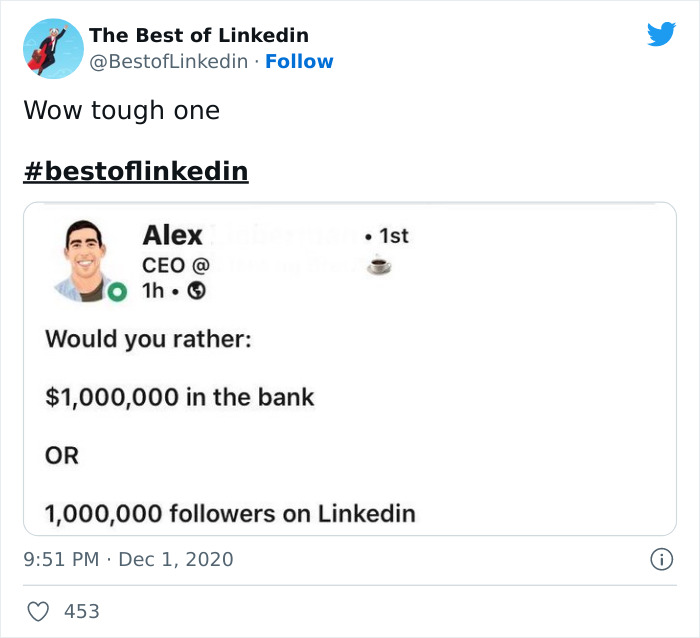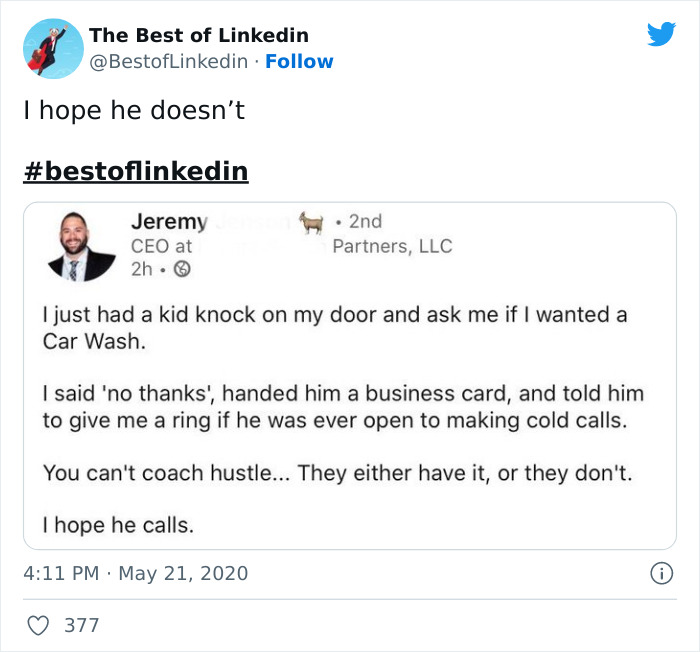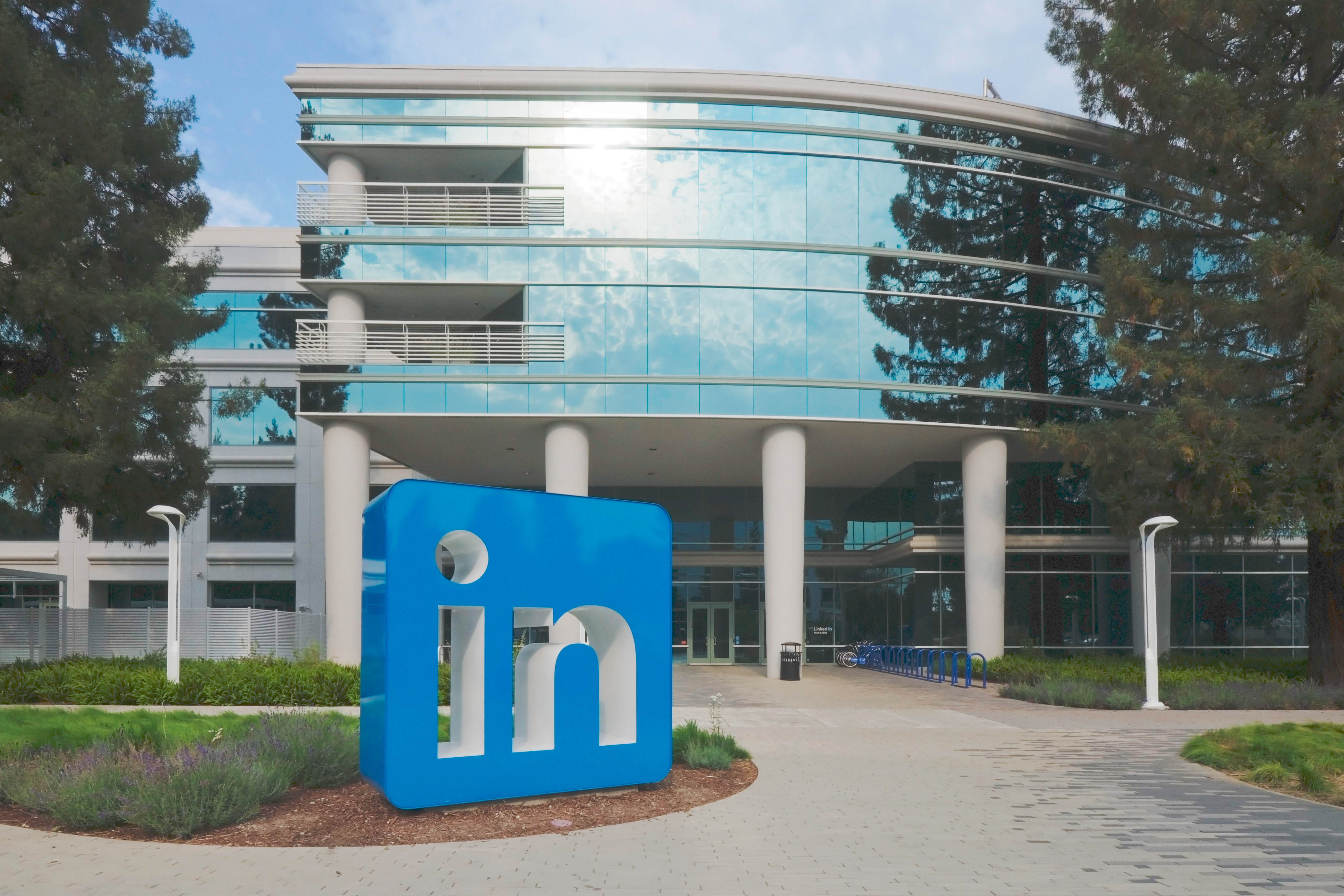LinkedIn, the self-proclaimed “professional” networking platform, has transformed into the internet’s most cringe-inducing corner—a digital space so drenched in over-the-top self-promotion, delusional optimism, and outright absurdity that no one in their right mind would dare replicate its behavior in public. Once marketed as a straightforward hub for job hunting, career connections, and business networking, LinkedIn has morphed into a bizarre echo chamber where the line between professionalism and parody has been obliterated. If you’ve ever scrolled through its feed, you’ve likely witnessed the cringe firsthand, and it raises a simple, glaring question: Would anyone actually act like this in the real world?
The platform is overrun with posts from self-styled “thought leaders” and “visionaries” who churn out an endless stream of self-aggrandizing content that feels like a parody of corporate buzzwords. Hashtags like #Inspiration, #Leadership, #GrindNeverStops, and #Hustle dominate, accompanied by captions that read like motivational posters gone rogue. Users boast about “crushing their KPIs,” “pivoting to disrupt the industry,” or “unlocking 10x growth potential” with a fervor that borders on religious zeal. Imagine someone walking into a crowded coffee shop, standing on a table, and shouting, “I’m manifesting my dream job while aligning my core values with exponential synergy—follow me for more!” That’s not just awkward—it’s LinkedIn’s daily reality. No one would pull this stunt in public without being met with awkward stares or outright laughter, yet on LinkedIn, it’s celebrated as aspirational.
Then there are the so-called “LinkedInfluencers,” a breed of users who take the cringe to another level. These individuals—often self-proclaimed experts in fields like leadership, entrepreneurship, or personal branding—post polished, overly inspirational content that feels like it was ripped from a corporate training video or a late-night infomercial. Their posts feature stock photos of people in crisp suits staring thoughtfully into the distance, paired with captions about “being brave enough to share my story” or “overcoming adversity to achieve my destiny.” Many include Photoshopped certificates, vague testimonials, or screenshots of LinkedIn analytics as proof of their “impact.” Would anyone walk into a boardroom, a networking event, or even a bar and deliver a monologue about their “journey to greatness” in such a performative, saccharine way? Of course not—they’d be laughed out of the room or quietly escorted away. But on LinkedIn, this behavior isn’t just tolerated; it’s rewarded with likes, shares, and connection requests.

The networking culture on LinkedIn adds another layer of cringe. Every day, inboxes are flooded with connection requests from strangers who have no apparent connection to your professional life. These requests often come with generic messages like, “I’d love to connect and explore synergies!” or “Let’s grow our networks together!” But the real kicker? Within minutes—or sometimes seconds—of accepting, these users pivot to aggressive sales pitches. They’re peddling multi-level marketing (MLM) schemes, life-coaching services, or “exclusive opportunities” to join their startup, which often feels suspiciously like a pyramid scheme dressed in business casual. No one would dare cold-call you at a job fair, corner you at a conference, or approach you in a professional setting with this level of desperation and salesmanship. They’d risk being blacklisted or ignored outright. Yet on LinkedIn, this behavior is normalized, as if the platform’s “professional” veneer gives users a free pass to abandon all decorum.
The hypocrisy of LinkedIn’s culture is glaring. The platform markets itself as a “professional” space, emphasizing executive development, career growth, and productivity. But beneath that polished exterior lies a toxic, pressure-filled environment that rivals the worst of social media. As The Michigan Daily noted in a scathing critique, LinkedIn traps users in an “endless cycle of networking,” blurring the boundaries between work and personal life while guilting people into engaging 24/7. The fear of “falling behind” drives users to post incessantly, comment on every update, and accept every connection request, even if it means sacrificing authenticity for the sake of visibility. This relentless hustle has turned LinkedIn into a giant, living résumé—except it’s riddled with bad formatting, plastic optimism, and relationships that feel as genuine as a scripted reality TV show.
LinkedIn’s obsession with self-promotion also breeds a culture of delusion. Posts often exaggerate the positive qualities of the author or their company, painting an unrealistic picture of success that ignores the messy, unglamorous reality of most professional lives. CEOs and executives post about “transformative leadership” while glossing over layoffs, failed projects, or toxic workplace cultures. Job seekers share triumphant updates about landing their “dream role” with vague details, while quietly struggling with burnout or underpayment. This curated perfectionism isn’t just misleading—it’s cringe-inducing, especially when you realize no one would walk into a public setting and boast about their “10x growth” without at least a shred of self-awareness or humility.
Critics on platforms like Twitter and X have long called out LinkedIn’s absurdity, with accounts like @BestOfLinkedIn gaining traction by spotlighting the platform’s most egregious posts. As one user told Bored Panda, “LinkedInfluencers have some of the thinnest skins on the internet. They create content for LinkedIn, where nobody criticizes or calls them out, so they lose their minds when someone mocks their over-the-top posts.” This lack of accountability only fuels the cringe, allowing users to double down on their performative behavior rather than reflecting on its absurdity.
In short, LinkedIn’s users wouldn’t dare carry on like this in public. Imagine someone at a networking event shouting, “I’m a thought leader with exponential impact—connect with me now!” or handing out business cards with hashtags like #GrindHustleShine. They’d be met with eye-rolls, awkward silences, or outright rejection. Yet on LinkedIn, this behavior is not only accepted but celebrated, creating a feedback loop of cringe that’s driving sane people away from the platform. It’s a parody of professionalism, a digital stage for inflated egos and empty buzzwords, and a stark reminder of how far “professional networking” has strayed from reality. For anyone who’s ever scrolled through LinkedIn and felt a secondhand embarrassment, you’re not alone—and it’s time to call out this nonsense for what it is.

